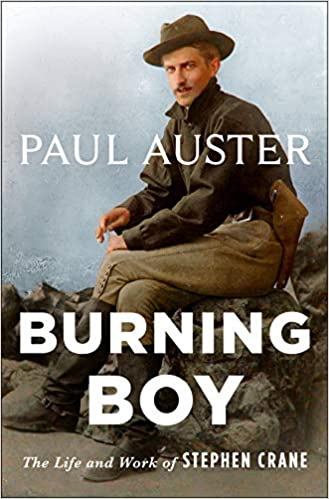I saw a creature, naked, bestial,
Who, squatting upon the ground,
Held his heart in his hands,
And ate of it.
I said, “Is it good, friend?”
“It is bitter—bitter,” he answered;
“But I like it
“Because it is bitter,
“And because it is my heart.”
"In the Desert" by Stephen Crane
Pre-pandemic, I visited the Stephen Crane House in Asbury Park, New Jersey where Stephen lived on and off in his younger days. By the age of twenty, Crane was writing for a news bureau in Asbury Park, a town that was known as a beach resort for the middle classes.
The house went through many owners and fell into deep disrepair and was finally taken by the town's historical society as their home. I don't think any of the furnishings are from the Crane family but it does have period pieces and Crane memorabilia.
Stephen Crane's first short novel was Maggie: A Girl of the Streets which was published in 1893 when he was 22. Like much of his writing, he imagined what it might be in another kind of life. He was a well-bred kid from New Jersey but writing about a decent girl forced into prostitution by poverty. He was a realist and the novel is unsentimental about Maggie and her place in life. One stylistic aspect you notice is that Crane is very good at dialogue and uses it quite a lot. Paul Auster in writing a Crane biography feels that Crane was an early, if not the first, scriptwriter. (Though that title probably belongs to a playwright.)
He is still best known for the 1895 novel The Red Badge of Courage,. This Civil War novel was written decades after the war and Crane had no military service. He likely based it on other memoirs and may have talked to Civil War veterans who were around him.
Crane would later become a war correspondent. He would go to Cuba to cover the Spanish-American War and would report on the Greek-Turkish and Spanish-American Wars. Some critics consider his journalism to be his strongest writing, but that journalistic style certainly influenced his fiction.
Born in 1871 into a minister's household in Newark, NJ, he went in and out of prep schools and did a brief time at Syracuse University where it seems he was more interested in and better at baseball.
The Red Badge of Courage sold well (much better than Maggie) and made him a celebrity. He made decent money as a writer but led a pretty wild and extravagant life, so he often seemed poor. He was a smoker and drinker since his younger days. (It is said he began both at age 6, though that seems unlikely.)
He left America to report on wars in Cuba and Crete. He fell in love with the madame of a Florida brothel and then moved to England. He wrote a lot but seemed to barely make ends meet.
He contracted tuberculosis and was sent to a sanitarium in Germany but it was too late to save him. He died in 1900 at age 28. Had he lived a long life, he might have still been writing in my lifetime. I wonder what he would have written in the 20th century.
I have returned to Crane recently through the biography Burning Boy: The Life and Work of Stephen Crane by Paul Auster,. Auster is a well-respected novelist himself. Crane, Auster and myself were all born in Newark, NJ. That could be a cosmic connection we have. I visited Crane's gravesite in Hillside, NJ when I was a teenager and was reading all of his writing.
I had read The Red Badge of Courage on my own, though it was on many high school reading lists back then. I liked it but didn't love it. I was reading it at the time of the Vietnam War and I was draft-eligible so what most hit me in his novel was being a person who was unprepared to go to war. Would I be brave or would I want to run. I went on to read Maggie which my young male teen brain probably thought would be sexier. It wasn't - but I liked it a lot.
It was when I got to Crane's poetry that I really became interested in his writing and life. Considering that he is a purely 1ith century writer, his poetry seems very modern. The Black Riders from 1895 was his first poetry collection. I have seen it compared to Emily Dickinson - if Emily had spent some time in big cities and hung out with streetwalkers.
This first book of poems was initially printed in bold capital letters. I would find that annoying to read and all the editions I have read use conventional capitalization. But Crane, like Emily, must have intended it to appear like this:
BLACK RIDERS CAME FROM THE SEA.
THERE WAS CLANG AND CLANG OF SPEAR AND SHIELD,
AND CLASH AND CLASH OF HOOF AND HEEL,
WILD SHOUTS AND THE WAVE OF HAIR
IN THE RUSH UPON THE WIND:
THUS THE RIDE OF SIN.
Of the poem "In the Desert" that tops this post, Auster said "...I think there are probably 50 ways to interpret it, and one of them seems to be how persistently we cling to our own misery, how we actually fall in love with our own unhappiness." (listen to an interview with Auster talking about his Crane bio) We used that poem as a model for a 2009 prompt on the website.
Another easy entry to Crane's prose is his short stories. The most popular ones are “The Open Boat,” “The Blue Hotel,” “The Monster” (a novella), and “The Bride Comes to Yellow Sky.”
A man said to the universe:
“Sir, I exist!”
“However,” replied the universe,
“The fact has not created in me
A sense of obligation.”
For all of our past writing prompts and more than 300 issues of poems, visit our website at
poetsonline.org





